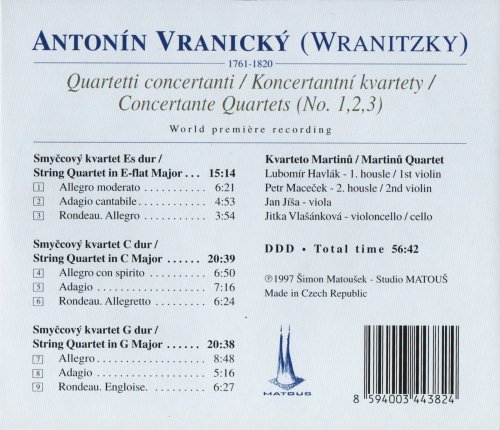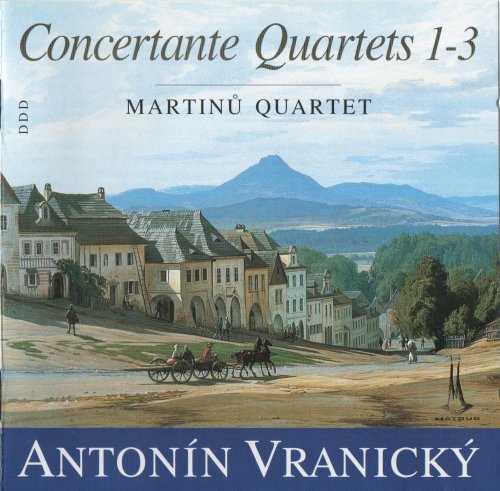
Martinů Quartet - Antonín Vranický: Concertante Quartets 1-3 (1997)
BAND/ARTIST: Martinů Quartet
- Title: Antonín Vranický: Concertante Quartets 1-3
- Year Of Release: 1997
- Label: Studio Matouš
- Genre: Classical
- Quality: FLAC (image+.cue,log,scans)
- Total Time: 56:42
- Total Size: 303 Mb
- WebSite: Album Preview
Tracklist:
Antonín Vranický (1761-1820)
String Quartet In E Flat Major
1. Allegro Moderato 6:21
2. Adagio Cantabile 4:53
3. Rondeau. Allegro 3:54
String Quartet In C Major
4. Allegro Con Spirito 6:50
5. Adagio 7:16
6. Rondeau. Allegretto 6:24
String Quartet In G Major
7. Allegro 8:48
8. Adagio 5:16
9. Rondeau. Englaise 6:27
Performers:
Martinů Quartet

Antonín Vranický (1761-1820)
String Quartet In E Flat Major
1. Allegro Moderato 6:21
2. Adagio Cantabile 4:53
3. Rondeau. Allegro 3:54
String Quartet In C Major
4. Allegro Con Spirito 6:50
5. Adagio 7:16
6. Rondeau. Allegretto 6:24
String Quartet In G Major
7. Allegro 8:48
8. Adagio 5:16
9. Rondeau. Englaise 6:27
Performers:
Martinů Quartet
In many ways, Antonin Vranicky (1761-1820) was overshadowed by his flamboyant older brother, Pavel. The elder Vranicky was prominent in the Vienna social arena at the height of the Classical era, and left us with a wealth of marvelous works. Not nearly as prolific, Antonin preferred to work behind the scenes, teaching, helping found the Vienna violin school and writing a tract on the fundamentals of the violin. A student of Haydn, Mozart and Albrechtsberger, he was the long time leader of Prince Lobkowicz's orchestra. Famous for his brilliant playing, he was also a composer. Unlike his brother who excelled in a variety of forms, Anton favored chamber music, and of these, the most numerous group were his 30 string quartets.
These works clearly benefit from having a virtuoso violinist as composer with the bulk of the melodic duty is allocated to the 1st violin. Still, they demonstrate sufficient dedication to the string quartet form by allowing each instrument take its turn center stage. The quartets on this disc follow the three movement format of `Allegro-Adagio-Rondo', and show early Romantic features, almost reminiscent of Schubert.
A playful looping theme opens the 1st Quartet, composed in E Flat, returning in numerous permutations throughout the 1st movement 'Allegro moderato'. In keeping with the `concertante' style where other instruments merely accompany the lead voice, the majority of the melodic lines are delivered by the 1st violin, although in one section there is a marvelous extended exchange with the viola. And in another, the cello assumes the spotlight with a series of vigorous, fleet fingered running notes just before the final chord.
With overtones of a darker mood, a gentle `Adagio' displays the engaging artistry of the lead violinist, Lubomir Havlak. One notable section features a skillful interplay with the cello, employing the uppermost register of the bass voice. A rustic dance opens the 3rd movement `Rondo', using three repeated notes to create a driving urgency throughout the piece. Eastern European country fiddling fills this joyous finale.
Written in C Major, Quartet No.2 begins with a gaily skipping tune from the lead voice, teasingly alternating with the 2nd violin. Syncopated rhythms with unexpected shifts make this `Allegro con spirito' memorable. The gorgeous `Adagio' that follows features a softly pulsing accompaniment in the lower voices, while the 1st violin soars high on the `E' string. Solemn, almost prayerful periodic pauses allow the delicate mood to reverberate in the silences that occur throughout the 2nd movement.
The triple metered finale opens with a merry theme, with one of the early variations presented unexpectedly in a minor key. Another episode slides into a somber, almost funereal mood before the refrain returns for a rousing conclusion.
The third quartet in G Major features the accomplished viola of Jan Jisa and the deft work of Jitka Vlasankova on cello in the imaginative opening `Allegro', which allows the lower strings to shine. Shimmering tones of the violin adorn the elegant `Adagio' that follows.
Marked `Engloise', a delightful, dancing `Rondo' closes the work. After an initial presentation of the infectious theme, this 3rd movement shifts to a different atmosphere entirely. Hushed staccato lower strings accompany the frantic bow work of the lead violinist, briefly relinquishing the melody to the cello before returning for the bubbly refrain and closing the quartet, and the recording in a whisper.
Clean and spacious, the recording by Studio Matous displays the Martinu Quartet in top form. These are marvelous string quartets, composed in Vienna at the height of Classicism. Overshadowed by the giants of the time, they offer another glimpse into the milieu that made Haydn, Mozart and Beethoven possible.
These works clearly benefit from having a virtuoso violinist as composer with the bulk of the melodic duty is allocated to the 1st violin. Still, they demonstrate sufficient dedication to the string quartet form by allowing each instrument take its turn center stage. The quartets on this disc follow the three movement format of `Allegro-Adagio-Rondo', and show early Romantic features, almost reminiscent of Schubert.
A playful looping theme opens the 1st Quartet, composed in E Flat, returning in numerous permutations throughout the 1st movement 'Allegro moderato'. In keeping with the `concertante' style where other instruments merely accompany the lead voice, the majority of the melodic lines are delivered by the 1st violin, although in one section there is a marvelous extended exchange with the viola. And in another, the cello assumes the spotlight with a series of vigorous, fleet fingered running notes just before the final chord.
With overtones of a darker mood, a gentle `Adagio' displays the engaging artistry of the lead violinist, Lubomir Havlak. One notable section features a skillful interplay with the cello, employing the uppermost register of the bass voice. A rustic dance opens the 3rd movement `Rondo', using three repeated notes to create a driving urgency throughout the piece. Eastern European country fiddling fills this joyous finale.
Written in C Major, Quartet No.2 begins with a gaily skipping tune from the lead voice, teasingly alternating with the 2nd violin. Syncopated rhythms with unexpected shifts make this `Allegro con spirito' memorable. The gorgeous `Adagio' that follows features a softly pulsing accompaniment in the lower voices, while the 1st violin soars high on the `E' string. Solemn, almost prayerful periodic pauses allow the delicate mood to reverberate in the silences that occur throughout the 2nd movement.
The triple metered finale opens with a merry theme, with one of the early variations presented unexpectedly in a minor key. Another episode slides into a somber, almost funereal mood before the refrain returns for a rousing conclusion.
The third quartet in G Major features the accomplished viola of Jan Jisa and the deft work of Jitka Vlasankova on cello in the imaginative opening `Allegro', which allows the lower strings to shine. Shimmering tones of the violin adorn the elegant `Adagio' that follows.
Marked `Engloise', a delightful, dancing `Rondo' closes the work. After an initial presentation of the infectious theme, this 3rd movement shifts to a different atmosphere entirely. Hushed staccato lower strings accompany the frantic bow work of the lead violinist, briefly relinquishing the melody to the cello before returning for the bubbly refrain and closing the quartet, and the recording in a whisper.
Clean and spacious, the recording by Studio Matous displays the Martinu Quartet in top form. These are marvelous string quartets, composed in Vienna at the height of Classicism. Overshadowed by the giants of the time, they offer another glimpse into the milieu that made Haydn, Mozart and Beethoven possible.

DOWNLOAD FROM ISRA.CLOUD
Martinů Quartet Antonín Vranický Concertante Quartets 97 0810.rar - 303.8 MB
Martinů Quartet Antonín Vranický Concertante Quartets 97 0810.rar - 303.8 MB
Classical | FLAC / APE | CD-Rip
As a ISRA.CLOUD's PREMIUM member you will have the following benefits:
- Unlimited high speed downloads
- Download directly without waiting time
- Unlimited parallel downloads
- Support for download accelerators
- No advertising
- Resume broken downloads


